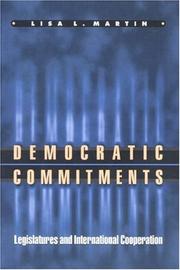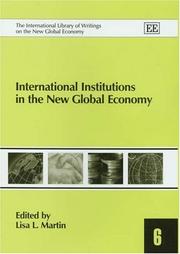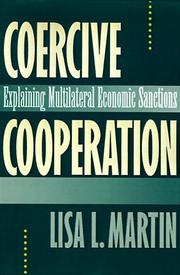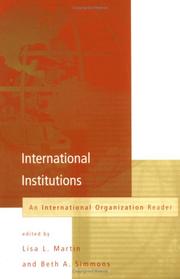| Listing 1 - 10 of 10 |
Sort by
|

ISBN: 0691009236 0691009244 9786612767104 1282767100 1400823706 9781400823703 9780691009230 9780691009247 1400812615 9781400812615 9781282767102 Year: 2000 Publisher: Princeton, N.J. Princeton University Press
Abstract | Keywords | Export | Availability | Bookmark
 Loading...
Loading...Choose an application
- Reference Manager
- EndNote
- RefWorks (Direct export to RefWorks)
From the refusal of the U.S. Congress to approve fast-track trade authority and certain foreign aid packages to the obstacles placed by Western European parliaments in the path of economic integration, legislatures often interfere with national leaders' efforts to reach and implement predictable international agreements. This seems to give an advantage to dictators, who can bluff with confidence and make decisions without consultation, and many assume that even democratic governments would do better to minimize political dissent and speak foreign policy from a single mouth. In this thoughtful, empirically grounded challenge to the assumption that messy domestic politics undermine democracies' ability to conduct international relations, Lisa Martin argues that legislatures--and particularly the apparently problematic openness of their proceedings--actually serve foreign policy well by giving credibility to the international commitments that are made. Examining the American cases of economic sanctions, the use of executive agreements versus treaties, and food assistance, in addition to the establishment of the European Union, Martin concludes that--if institutionalized--even rancorous domestic conversations between executives and legislatures augment rather than impede states' international dealings. Such interactions strengthen and legitimize states' bargaining positions and international commitments, increasing their capacity to realize international cooperation. By expanding our comprehension of how domestic politics affect international dialogue, this work is a major advance in the field of international relations and critical reading for those who study or forge foreign policy.
International relations. Foreign policy --- International cooperation. --- Legislative bodies --- Legislative bodies. --- Aide internationale --- Aide à l'étranger --- Collaboration internationale --- Cooperation [international ] --- Coopération bilatérale --- Coopération internationale --- Coopération interrégionale --- Coopération multilatérale --- Coopération régionale --- Etats-Unis. Congress --- Global governance --- Institutions [international ] --- Institutions internationales --- Interdependence of nations --- International cooperation --- International institutions --- Internationale samenwerking --- Parlementen --- Parlements --- United States. Congress --- Verenigde Staten. Congress --- World government --- World order --- Legislative bodies -- European Union countries. --- United States. --- United States. Congress. --- European Union countries --- United States. - Congress. --- Bicameralism --- Legislatures --- Parliaments --- Unicameral legislatures --- Constitutional law --- Estates (Social orders) --- Representative government and representation --- Cooperation, International --- Institutions, International --- Cooperation --- International relations --- International organization

ISBN: 1843764253 Year: 2005 Publisher: Cheltenham Edward Elgar
Abstract | Keywords | Export | Availability | Bookmark
 Loading...
Loading...Choose an application
- Reference Manager
- EndNote
- RefWorks (Direct export to RefWorks)
International agencies --- International economic relations --- International organization --- 334.0 --- 333.160 --- 333.164.0 --- 333.432.8 --- 334.81 --- AA / International- internationaal --- Federation, International --- Global governance --- Interdependence of nations --- International administration --- International federation --- Organization, International --- World federation --- World government --- World order --- World organization --- Congresses and conventions --- International relations --- Peace --- Political science --- International cooperation --- Security, International --- World politics --- Economic policy, Foreign --- Economic relations, Foreign --- Economics, International --- Foreign economic policy --- Foreign economic relations --- International economic policy --- International economics --- New international economic order --- Economic policy --- Economic sanctions --- Associations, International --- IGOs (Intergovernmental organizations) --- Institutions, International --- Inter-governmental organizations --- Intergovernmental organizations --- International associations --- International governmental organizations --- International institutions --- International organizations --- International unions --- Organizations, International --- Specialized agencies of the United Nations --- Interorganizational relations --- Non-state actors (International relations) --- Internationale financiële instellingen: algemeen --- Internationale Bank voor Herstel en Ontwikkeling: algemeen --- Internationale monetaire organisatie. Internationaal Muntfonds. Algemene leningovereenkomsten --- Wereldhandelsorganisatie (WHO). Algemene overeenkomst voor handel en tarieven (GATT)
Book
ISBN: 9780190233228 Year: 2015 Publisher: New York Oxford University Press
Abstract | Keywords | Export | Availability | Bookmark
 Loading...
Loading...Choose an application
- Reference Manager
- EndNote
- RefWorks (Direct export to RefWorks)
The Oxford Handbook of the Political Economy of International Trade surveys the literature on the politics of international trade and highlights the most exciting recent scholarly developments. The handbook is focused on work by political scientists that draws extensively on work in economics, but is distinctive in its applications and attention to political features; that is, it takes politics seriously. The handbook’s framework is organized in part along the traditional lines of domestic society—the interaction between domestic and international institutions —but elaborates this basic framework to showcase the most important new developments in our understanding of the political economy of trade. Within the field of international political economy, international trade has long been and continues to be one of the most vibrant areas of study. Drawing on models of economic interests and integrating them with political models of institutions and society, political scientists have made great strides in understanding the sources of trade policy preferences and outcomes. The twenty-sevenchapters in thishandbook include contributions from prominent scholars around the globe and from multiple theoretical and methodological traditions. The handbook considers the development of concepts and policies about international trade; the influence of individuals, firms, and societies; the role of domestic and international institutions; and the interaction of trade and other issues, such as monetary policy, environmental challenges, and human rights. Showcasing both established theories and findings and cutting-edge new research, thishandbook is a valuable reference for scholars of political economy
International trade --- Commercial policy --- Foreign trade policy --- International trade policy --- Trade policy --- Economic policy --- International economic relations --- External trade --- Foreign commerce --- Foreign trade --- Global commerce --- Global trade --- Trade, International --- World trade --- Commerce --- Non-traded goods --- Government policy
Book
ISBN: 9780199981755 0199981752 Year: 2015 Publisher: Oxford: Oxford university press,
Abstract | Keywords | Export | Availability | Bookmark
 Loading...
Loading...Choose an application
- Reference Manager
- EndNote
- RefWorks (Direct export to RefWorks)
The Oxford Handbook of the Political Economy of International Trade surveys the literature on the politics of international trade and highlights the most exciting recent scholarly developments. The handbook is focused on work by political scientists that draws extensively on work in economics, but is distinctive in its applications and attention to political features; that is, it takes politics seriously. The handbook’s framework is organized in part along the traditional lines of domestic society—the interaction between domestic and international institutions —but elaborates this basic framework to showcase the most important new developments in our understanding of the political economy of trade. Within the field of international political economy, international trade has long been and continues to be one of the most vibrant areas of study. Drawing on models of economic interests and integrating them with political models of institutions and society, political scientists have made great strides in understanding the sources of trade policy preferences and outcomes. The twenty-sevenchapters in thishandbook include contributions from prominent scholars around the globe and from multiple theoretical and methodological traditions. The handbook considers the development of concepts and policies about international trade; the influence of individuals, firms, and societies; the role of domestic and international institutions; and the interaction of trade and other issues, such as monetary policy, environmental challenges, and human rights. Showcasing both established theories and findings and cutting-edge new research, thishandbook is a valuable reference for scholars of political economy.

ISBN: 0691034761 0691086249 Year: 1994 Publisher: Princeton, N.J. Princeton University Press
Abstract | Keywords | Export | Availability | Bookmark
 Loading...
Loading...Choose an application
- Reference Manager
- EndNote
- RefWorks (Direct export to RefWorks)
Book
ISBN: 9780691227825 Year: 2021 Publisher: Princeton, NJ
Abstract | Keywords | Export | Availability | Bookmark
 Loading...
Loading...Choose an application
- Reference Manager
- EndNote
- RefWorks (Direct export to RefWorks)

ISBN: 0262632233 Year: 2001 Publisher: Cambridge (Mass.) : MIT press,
Abstract | Keywords | Export | Availability | Bookmark
 Loading...
Loading...Choose an application
- Reference Manager
- EndNote
- RefWorks (Direct export to RefWorks)

ISBN: 9780262632232 Year: 2001 Publisher: Cambridge (Mass.) MIT Press
Abstract | Keywords | Export | Availability | Bookmark
 Loading...
Loading...Choose an application
- Reference Manager
- EndNote
- RefWorks (Direct export to RefWorks)
Book

ISBN: 1283163659 9786613163653 1400830788 9781400830787 9780691140278 0691140278 9780691140285 0691140286 Year: 2009 Publisher: Princeton, NJ
Abstract | Keywords | Export | Availability | Bookmark
 Loading...
Loading...Choose an application
- Reference Manager
- EndNote
- RefWorks (Direct export to RefWorks)
Since they were pioneered in the 1970's by Robert Keohane and others, the broad range of neoliberal institutionalist theories of international relations have grown in importance. In an increasingly globalized world, the realist and neorealist focus on states, military power, conflict, and anarchy has more and more given way to a recognition of the importance of nonstate actors, nonmilitary forms of power, interdependence, international institutions, and cooperation. Drawing together a group of leading international relations theorists, this book explores the frontiers of new research on the role of such forces in world politics. The topics explored in these chapters include the uneven role of peacekeepers in civil wars, the success of human rights treaties in promoting women's rights, the disproportionate power of developing countries in international environmental policy negotiations, and the prospects for Asian regional cooperation. While all of the chapters demonstrate the empirical and theoretical vitality of liberal and institutionalist theories, they also highlight weaknesses that should drive future research and influence the reform of foreign policy and international organizations. In addition to the editors, the contributors are Vinod Aggarawal, Jonathan Aronson, Elizabeth DeSombre, Page Fortna, Michael Gilligan, Lisa Martin, Timothy McKeown, Ronald Mitchell, Layna Mosley, Beth Simmons, Randall Stone, and Ann Tickner.
International agencies. --- International relations. --- Non-governmental organizations. --- Non-governmental organizations --- International agencies --- International relations --- Law, Politics & Government --- International Relations --- Coexistence --- Foreign affairs --- Foreign policy --- Foreign relations --- Global governance --- Interdependence of nations --- International affairs --- Peaceful coexistence --- World order --- National security --- Sovereignty --- World politics --- Associations, International --- IGOs (Intergovernmental organizations) --- Institutions, International --- Inter-governmental organizations --- Intergovernmental organizations --- International administration --- International associations --- International governmental organizations --- International institutions --- International organizations --- International unions --- Organizations, International --- Specialized agencies of the United Nations --- International cooperation --- Interorganizational relations --- Non-state actors (International relations) --- International organization --- INGOs (International agencies) --- International non-governmental organizations --- NGOs (International agencies) --- Nongovernmental organizations --- Organizations, Non-governmental (International agencies) --- Private and voluntary organizations (International agencies) --- PVOs (International agencies) --- Nonprofit organizations
Book

ISBN: 9780691234687 Year: 2021 Publisher: Princeton, NJ
Abstract | Keywords | Export | Availability | Bookmark
 Loading...
Loading...Choose an application
- Reference Manager
- EndNote
- RefWorks (Direct export to RefWorks)
| Listing 1 - 10 of 10 |
Sort by
|

 Search
Search Feedback
Feedback About UniCat
About UniCat  Help
Help News
News